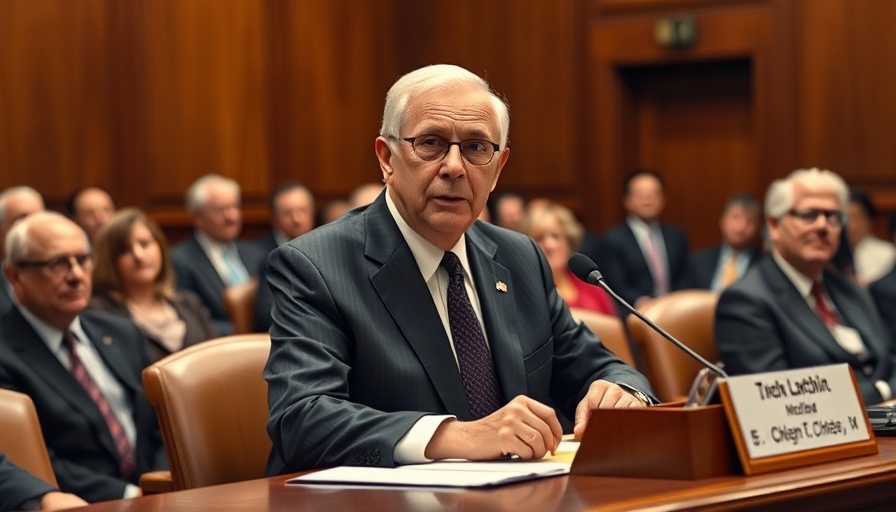
Amid Controversy, Paul Atkins Faces Senate Committee
During a recent Senate Banking Committee hearing, Paul Atkins, President Donald Trump’s nominee for the chair of the Securities and Exchange Commission (SEC), found himself under a spotlight of scrutiny over his past regulatory actions and potential conflicts of interest. This tense session highlighted not only Atkins's historical role during critical pre-financial crisis years but also the ongoing dialogue about regulatory efficacy in today’s complex financial landscape.
Warren’s Challenge: A Dive into Conflicts of Interest
Atkins was met with pointed questioning from Senator Elizabeth Warren, a fierce advocate for regulation, who raised concerns about his simultaneous role as the head of Patomak Capital Partners. "Patomak counts every kind of financial firm subject to the SEC’s rules among its clients," Warren noted, advocating for transparency about how these ties might influence his decisions at the helm of the SEC.
A Legacy of Deregulation: Lessons Learned from the Past
Atkins's tenure at the SEC from 2002 to 2008 has been contentious, particularly in hindsight. His previous claims that advocates for stronger regulations were "wallowing in a period of irrational pessimism" stand in stark contrast to today’s understanding of the 2008 financial crisis. As financial stability remains paramount, his assertion that the root cause of the failures was 'misregulation' rather than a need for more oversight raises questions about the lessons learned from history. A repeating theme in regulatory discussions is the delicate balance between over-regulation and under-regulation; wherein lies the answer will undeniably influence both current and future market participants.
Smart Regulations: A Focus on Tailoring Financial Oversight
In his opening remarks, Atkins asserted a vision for regulations that emphasizes being "smart, effective, and appropriately tailored." This perspective addresses a key concern for many in the business community: that regulations often miss the mark due to a disconnect between regulators and the industries they govern. As Atkins put it, "Unfortunately, lawyers do not speak the same language as businesspeople, or compliance professionals or IT staff." The potential for miscommunication can lead to regulations that are ineffective or overly burdensome, fostering an environment where compliance becomes a ticking clock rather than a partnership for fostering growth.
Wealth Inequality and the SEC Chair Nominee
If confirmed, Atkins will emerge as one of the wealthiest SEC chairs in decades, with a reported net worth of at least $327 million. This raises profound questions about the intersection of wealth and regulatory power. Critics may argue that someone with such financial interests may inherently bias their approach to regulations impacting wealth management, compliance practices, and financial securities.
What’s at Stake for Business Owners and Entrepreneurs?
For small business owners and entrepreneurs, such as those in the target demographic of this discussion, Atkins’s confirmation and the regulatory changes that may follow could have significant ripple effects. As financial independence and business growth remain central to their values, the environment fostered by the SEC will inevitably shape their operational landscape.
Engagement and Responsiveness: A Framework for the Future
Despite the probing questions, Atkins refrained from detailing specific future plans that might address these concerns, opting instead to express commitment toward more responsive regulation. For business leaders looking for actionable strategies, understanding the evolving regulatory landscape is crucial. Staying informed about potential shifts in SEC policies can be the difference between thriving and merely surviving.
Broader Implications for Future Financial Oversight
The confirmation process not only reflects on Atkins’s qualifications but may also signal the direction of U.S. financial oversight moving forward. Should he prevail, the philosophy and strategies exuded by the SEC will come under scrutiny as they evolve to address an increasingly complicated and interconnected economy. The key takeaway for readers is this: understanding the nuances of regulatory change can empower business leaders to navigate their enterprises strategically through potential storms on the horizon.
In closing, as the confirmation process unfolds, it’s important for those vested in financial markets and small businesses to stay engaged in discussions surrounding their regulatory environment. Recognizing the implications of Atkins’s past and potential future policies can arm you with insights that help in gaining a competitive edge.
 Add Row
Add Row  Add
Add 




 Add Row
Add Row  Add
Add 

Write A Comment